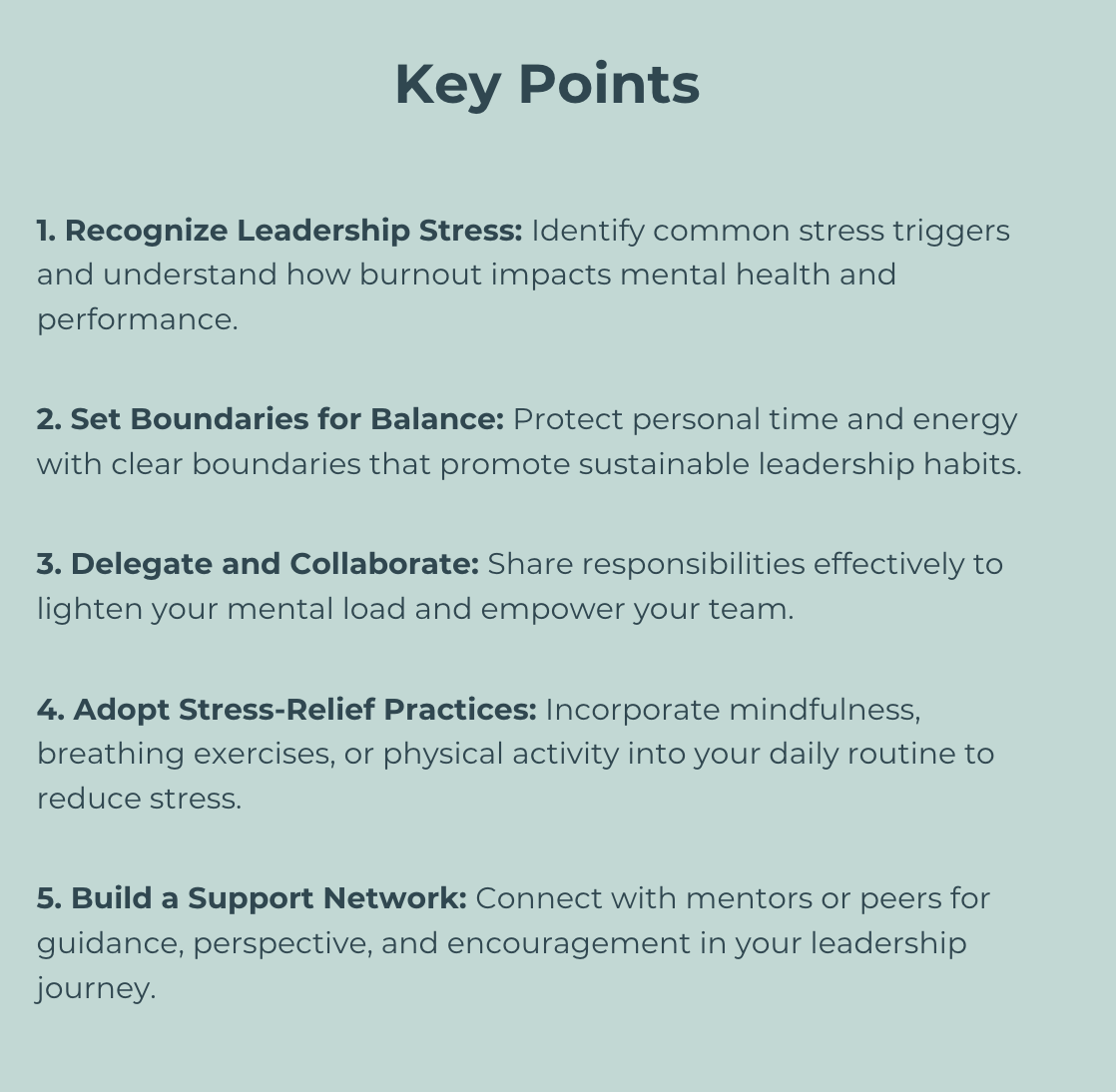Managing Leadership Stress for Long-Term Mental Health and Resilience
What to Consider When Reading:
What are the specific stress triggers in your leadership role, and how do they affect your mental health?
How can building resilience improve your ability to navigate challenges and lead your team effectively?
Leadership comes with high expectations—managing teams, solving problems, and making impactful decisions, often under intense pressure. While the rewards of leadership can be fulfilling, the constant demands can also take a toll on mental health. Prolonged stress, if unmanaged, can lead to burnout, emotional exhaustion, and even long-term health issues.
The good news? Leadership stress doesn’t have to be a given. By developing proactive strategies for stress management and resilience, leaders can maintain mental health, make better decisions, and sustain their energy for the long haul. Let’s explore how to recognize leadership stress, why resilience matters, and practical ways to build it.
The Cost of Leadership Stress
Understanding Leadership Burnout
Burnout doesn’t happen overnight; it’s a slow erosion of energy and enthusiasm caused by chronic stress. For leaders, it often manifests as decision fatigue, irritability, or a growing sense of detachment. Symptoms like trouble sleeping, difficulty concentrating, and loss of motivation can signal that stress has taken its toll.
The Hidden Risks
Unchecked stress impacts more than just your mood. It can weaken relationships, impair judgment, and even lead to physical issues like hypertension or heart disease. Beyond personal consequences, leadership stress can ripple through teams, affecting morale, productivity, and collaboration.
Why Resilience is Essential for Leaders
Resilience isn’t about avoiding stress—it’s about bouncing back from challenges and maintaining mental clarity during difficult times. Resilient leaders are better equipped to handle setbacks, adapt to changing circumstances, and inspire their teams even in uncertainty.
Resilience also acts as a buffer against burnout, helping leaders maintain their mental health while navigating the complexities of their roles. By building resilience, leaders create a sustainable foundation for long-term success.
Strategies for Managing Leadership Stress
1. Identify Your Stress Triggers
Self-awareness is the first step to managing stress. Identify patterns or situations that heighten your stress levels. Is it tight deadlines? Navigating team conflicts? Unrealistic expectations?
Action Tip: Keep a stress journal for a week, noting when you feel stressed and what triggered it. Recognizing patterns allows you to take proactive steps to manage them.
2. Set Clear Boundaries
The "always-on" culture can blur the lines between work and personal life. Setting clear boundaries ensures you have time to recharge.
Action Tip: Establish non-negotiable “off-duty” times. Whether it’s avoiding emails after 7 PM or protecting weekends for family, make these boundaries a priority.
3. Leverage Delegation and Collaboration
Many leaders feel the need to shoulder every responsibility, but delegation isn’t a sign of weakness—it’s a strength. Sharing responsibilities empowers your team and reduces your mental load.
Action Tip: Identify tasks that can be delegated and match them to team members’ strengths. Clear communication ensures accountability without micromanagement.
4. Incorporate Stress-Relief Practices into Your Day
Consistent stress-relief habits can help you manage daily challenges. Practices like mindfulness, deep breathing, or even a 10-minute walk can do wonders for your mental health.
Action Tip: Experiment with stress-reducing practices to find what works for you. Apps like Headspace or Calm can guide short mindfulness exercises tailored for busy leaders.
5. Develop Emotional Agility
Leadership often requires managing emotions—your own and others’. Emotional agility allows you to acknowledge stress or frustration without being overwhelmed by it.
Action Tip: Use reflective techniques, like journaling or a mental check-in, to process emotions. This practice helps you respond thoughtfully rather than react impulsively.
6. Build a Support Network
Leaders often feel isolated, but having a trusted network of peers, mentors, or friends can provide perspective and encouragement.
Action Tip: Join leadership groups or forums where you can share experiences and gain insights from others in similar roles.
Final Thoughts
Stress is an inevitable part of leadership, but how you manage it defines your long-term success. By building resilience, setting boundaries, and prioritizing mental health, you can lead with clarity and energy without burning out.
Remember, effective leadership isn’t just about results—it’s about sustainability. Taking care of your mental health is not a luxury; it’s a necessity for thriving in your role and inspiring your team. Start small, stay consistent, and watch as these habits transform your leadership journey.
Take the First Step Toward your Well-Being
At The Mental Game, we know that navigating life’s challenges requires more than just determination—it requires the right support and strategies tailored to your unique needs. Our team of seasoned professionals is dedicated to helping you build the mental resilience and skills necessary to excel, no matter what life throws your way.
Visit The Mental Game to learn more about our services and schedule your FREE consultation today and take the first step toward a healthier, more resilient mind.

